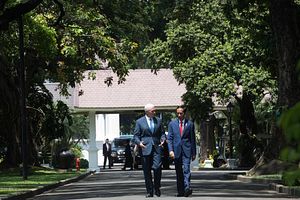Amid concerns about North Korea and rising tensions with China, Vice President Mike Pence’s visit to Indonesia during his third month in office signifies the country’s increasing importance in the region and the world. Indonesia’s geostrategic location, its economic clout, and its status as the world’s third largest democracy and home to the world’s largest Muslim population all speak to its potential as a leader in effectively addressing conflict in Asia. But Indonesia’s effectiveness as a partner for peace is threatened by lingering issues of impunity and a faltering capacity to ensure its democratic integrity.
Leaving these issues unaddressed undermines the current government’s legitimacy, inclusivity, and longevity. Indonesia should take concrete steps to strengthen democratic institutions for the wellbeing of its people and its political stability, and the United States has an interest and a responsibility to encourage this. Indonesia’s upcoming May 2017 United Nations Universal Periodic Review (UPR) is a benchmark for the country’s progress toward achieving human rights standards, including combating impunity and strengthening the judicial system. The UPR is a platform around which U.S. support, and that of UPR member states, could prove vital as they seek to bolster regional security at a time of unnerving uncertainty.
Indonesia has been widely praised for its recent commitments to democracy, including three direct presidential elections, the most recent of which brought President Joko Widodo (commonly known as “Jokowi”) to power in 2014. Yet there are signs that Indonesian democracy is headed for shaky ground. The April 19 runoff election for Jakarta governor followed months of increasingly violent rhetoric expressing growing intolerance toward ethnic and religious minorities. The mounting political influence of hard-line groups like the Islamic Defenders Front (FPI) and government support for “blasphemy” laws that limit religious expression are troubling indications of a narrowed democratic arena. Meanwhile, within Indonesia’s military and administration, there remain high-ranking figures accused of complicity in gross abuses of human rights who simultaneously hold sway over the trajectory of security sector reform. Jokowi’s appointment last year of former General Wiranto, who was implicated in the violent atrocities that accompanied Indonesia’s withdrawal from Timor-Leste in the 1990s, has sparked new concerns about the growing influence of undemocratic forces within the government and its lack of resolve to combat impunity.
Stalled transitional justice mechanisms also undermine Indonesia’s democratic potential. Victims of past human rights abuses, including the 1965-66 massacres of alleged “communists” that left up to a million dead, remain stigmatized, with their civil rights curtailed. Jokowi’s administration showed initial political commitment to addressing these issues, reflected in Indonesia’s Mid-Term Development Plan and last April’s National Symposium on the 1965 atrocities. Unfortunately, these commitments have not gone far enough. The political will shown at the symposium, Jokowi’s first real shot at accountability, was quickly thwarted by pressure from the opposition. Former Law, Politics, and Security Minister Luhut Panjaitan, who was tasked with convening the symposium and investigating and documenting the mass graves of victims, was replaced by Wiranto, who has stonewalled efforts to address past abuses. A report by Indonesian human rights organization KontraS (Commission for the Disappeared and Victims of Violence) states, “This failure to deliver justice reveals systemic weakness in the judiciary and a lack of political will in the administration.”
Ensuring the stability of Indonesia’s democratic system requires both accountability for its troubled past and a commitment to ensuring democratic reforms have a future. The upcoming Universal Periodic Review (UPR) and Pence’s recent visit are opportunities for Indonesia to demonstrate progress. But it isn’t Indonesia’s fight alone. The United States, alongside reviewing members of the UPR, has a stake in the advancement of Indonesia’s anti-impunity, judicial, and institutional goals to help ensure the security of the region. For Indonesia to be a model for Asia during turbulent times, it must not overlook the important and immediate efforts needed at home.
Dr. Leslie Dwyer is an Associate Professor and Director of the Center for the Study of Gender and Conflict at George Mason University’s School of Conflict Analysis & Resolution.

































